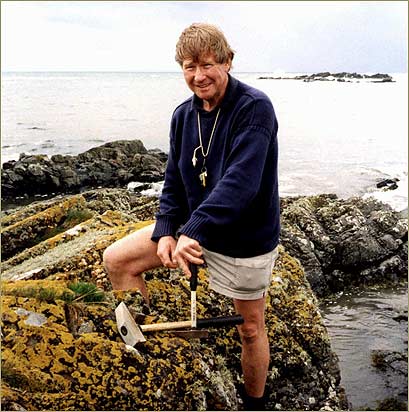 By Rolando Garcia
Natural Sciences and Mathematics Communications
A University of Houston geologist who unlocked the ancient history of the Appalachian Mountains and helped change the way scientists believe the planet’s surface was formed recently was honored with one of Ireland’s highest scholarly awards.
The work that made John Dewey one of the world’s leading geologists began with studying rocks in Ireland and continues today with pioneering research into the impact of massive tsunamis. For this five-decade career, and especially for his early work in Ireland, Dewey, a Distinguished Research Professor at UH, was given an honorary membership in the Royal Irish Academy in March.
The 200-year-old academy is one of Ireland’s leading cultural institutions and includes Irishmen who have won international distinction in the sciences or humanities. Honorary membership is extended to non-Irish scholars who, like Dewey, have a special connection to Ireland.
Dewey’s groundbreaking work on the Appalachians began nearly 50 years ago on the Emerald Isle, thousands of miles away from the North American mountain belt whose origins baffled geologists.
Dewey was researching the regional geology of western Ireland. That work soon took him to the Canadian province of Newfoundland on the Atlantic coast. Because Ireland and Newfoundland were connected millions of years ago, Dewey said, he crossed the ocean to delve deeper into the geological history of Ireland.
Working amid the upper reaches of the Appalachian belt in Newfoundland during the late 1960s was a fortunate happenstance, Dewey said.
Plate tectonics – the theory that the Earth’s crust is made up of a few massive plates whose movements over eons helped explain earthquakes, volcanic activity, mountain ranges and the movement of continents – was just taking shape. Although it is orthodoxy now, most geologists at the time rejected it.
But Dewey was at the forefront of this paradigm shift. Before plate tectonics, scientists had little idea how ranges like the Appalachians were formed.
“It suddenly clicked, and we realized how the whole thing worked,” Dewey said.
Dewey’s research demonstrated that the Northern Appalachians formed more than 300 million years ago from the collision of the North American and African continents. Because plates move at about the rate fingernails grow – about four centimeters a year – these collisions take place over millions of years.
Similarly, the collision of subcontinental India with Asia formed the Himalayas. Continental crust is less dense than oceanic crust, so when it collides with another continent, it is pushed up instead of pushed down back into the Earth’s mantle as at other plate boundaries, Dewey said.
These discoveries radically changed the field of geology, but Dewey said he was just lucky to be a young geologist working in the Appalachians just as plate tectonics emerged.
“Life is a random walk, and I was at the right place and the right time,” he said.
Dewey’s work also has earned him the Penrose Medal, the highest honor given by the Geological Society of America, and the Wollaston Medal of the Geological Society of London. He is also a member of the U.S. National Academy of Sciences and a Fellow of the Royal Society of London.
“John Dewey’s pioneering research into the field of plate tectonics and the development of mountain ranges has made him one of the world’s leading geologists, and we couldn’t be prouder to have him as a colleague,” said John Casey, chair of UH’s department of earth and atmospheric sciences. “This accolade is just the latest recognition of John’s transformational work, both in the field and in the classroom. And with his passion for geology and teaching, John still has a lot to contribute.”
Dewey’s accomplishments also are an indication of the kind of world-class scholars the university is attracting.
Field work is essential to geology, and Dewey has traveled all over the world with hammer in hand – from the Andes to Africa to Tibet –to study old rocks. But the Appalachians always will be his real love and his favorite stomping grounds, Dewey said.
At 71, Dewey has no intention of resting on his laurels. Some of his current research focuses on how huge tsunamis and freak waves can reshape the landscape. These waves can toss around 100-ton boulders and leave massive sediment deposits in their wake, Dewey said. He also is studying the impacts of collisions between continents and volcanic arcs. One example is Taiwan, where mountains are slowly rising as the island collides with China.
Dewey, a native of England, joined UH in 2006. He was a geology professor at the University of Oxford for several years and maintains an adjunct position as a senior research fellow at Oxford’s University College. |

